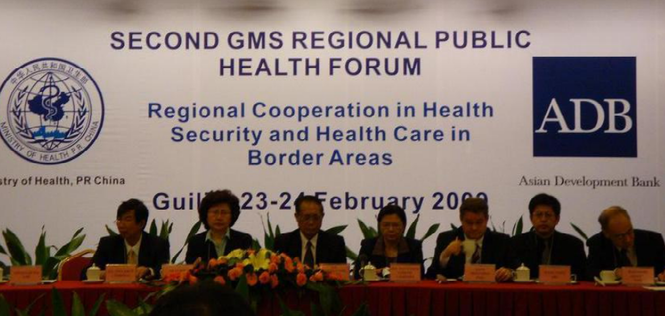
Diseases do not stop at the border. We share the challenges, and so we must share the solutions”, said Dr Ah Sian Tee, Director of Combating Communicable Diseases for the World Health Organisation’s Western Pacific Regional Office.
Dr Tee was addressing participants during the opening of the Asian Development Bank Greater Mekong Subregion (GMS) Public Health Forum in Guilin, China, 23-24 February.
The two-day For um brought together representatives from the governments of Cambodia, China, Laos, Myanmar, Thailand and Vietnam, and a number of development partners from UN and academic research institutes, as well as the IFRC. Its aim was to enhance regional cooperation in health security and health care in border areas in the GMS.
A session was also devoted to the strengthening of regional communicable disease control, considered particularly important in light of the threat of pandemic influenza. IDRL Asia Pacific Coordinator Victoria Bannon presented information on the joint Legal Preparedness Projects commencing in Laos and Vietnam and shared some preliminary findings from the Cambodia Legal Preparedness Project (see the preceding article).
During the discussions, the Deputy Director General of the Ministry of Health from Cambodia stated he was very proud of Cambodia’s progress with the project, highlighting the critical role of Cambodian Red Cross in being able to bring together different ministries and organisations to discuss legal arrangements and preparations for international assistance.
Indeed, the challenge of bringing together both disaster management and health practitioners for pandemic planning was highlighted by others and the central role of legal preparedness was a recurrent theme throughout. In the provisional “Concluding Statement” participants “noted the importance of the development of comprehensive national legal frameworks for the management of disasters and communicable disease emergencies, including for situations when international cooperation is required.”
They also insisted that “priority should be given to the implementation of key international instruments such as the International Health Regulations (IHR), the Asia Pacific Strategy on Emerging Diseases (APSED), and the Guidelines on the Domestic Facilitation and Regulation of International Disaster Relief and Initial Recovery Assistance (IDRL Guidelines). The Legal Preparedness Projects of IFRC and ADB were seen as making important contributions in this regard.”